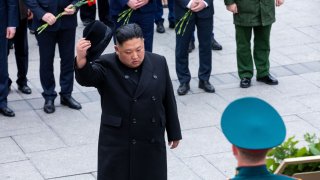Russia and North Korea: A Long-Term Strategic Partnership
Moscow-Pyongyang ties amount to much more than a marriage of convenience.
As the world observed Russia’s invasion of Ukraine, a surprising partnership took shape: Moscow and Pyongyang, two isolated authoritarian states, forged an increasingly visible alliance. Their relationship reached a new level with the signing of a Strategic Partnership Pact in June 2024, suggesting that their cooperation extends beyond mere convenience. While short-term gains have largely driven this alliance amid war and sanctions, a question arises: Will this bond endure beyond the Ukraine conflict, adapting to the evolving geopolitical landscape?
Short-Term Gains: A Marriage of Convenience
Given their diplomatic and economic isolation, Russia and North Korea have come to view each other as more valuable partners than traditionally perceived. In light of the protracted Ukraine war and China’s lukewarm support, Russia sought alternative military allies to achieve its objectives, turning to North Korea for military supplies. Meanwhile, North Korea, struggling with severe economic challenges exacerbated by sanctions, prolonged pandemic border closures, and natural disasters, found in Russia a crucial source of fuel, grain, and technology, alleviating its economic hardships. Amid their respective challenges, this alliance was urgently needed, proving mutually beneficial for the time being.
The Post-War Future: What Lies Beyond Ukraine?
Despite the attractiveness of this partnership, a conclusion of the Ukraine war may diminish the urgency of their cooperation. Russia would have less need for North Korea as an arms supplier. However, this does not mean the relationship will collapse. Rather than dissolving, the Russia-North Korea partnership will extend beyond the Ukraine war to serve broader strategic interests.
In the post-Ukraine war era, maintaining ties with Pyongyang secures Russia a foothold in Northeast Asia—offering leverage in future nuclear negotiations on the Korean Peninsula and an opportunity for its underutilized eastern region to integrate into the Northeast Asian economy. Instead of exporting ammunition, North Korea may continue to earn foreign currency by sending its laborers to assist with reconstruction in Russian-occupied areas after the war.
In the longer term, President Putin envisions Russia as a key player in a multipolar world, not just a secondary power next to the United States, China, and Europe. In this context, North Korea serves as a valuable strategic asset to carve out its space in the multipolar order alongside other pro-Russian countries such as Belarus, Iran, Syria, and Vietnam. For North Korea, the relationship offers a counterbalance not only to U.S. influence but also to China’s. In the post-Ukraine war period, the partnership will remain aligned with both nations’ long-term strategies to maintain influence and challenge the dominance inherent in the global order.
China’s Cautious Pragmatic Approach
China views this alliance with cautious pragmatism. While not eager to see Russia’s increasing influence in Pyongyang, which could undermine Beijing’s sway over North Korean decision-making, China is likely to tolerate, if not quietly support, this partnership.
This tolerance will persist as long as Russia’s involvement doesn’t destabilize the Korean Peninsula or threaten Beijing’s interests. After the end of the Ukraine War, Beijing might prepare to face a renewed Cold War with the United States by shifting its non-alliance policy to strengthen trilateral military cooperation with Russia and North Korea.
Implications for World Powers
For world powers, Russia’s engagement with North Korea signifies more than a short-term wartime tactic. It is a deliberate move to resist the Western-led global order and create alternative power structures. This necessitates a nuanced response that goes beyond punitive sanctions and support for Ukraine and considers the broader geopolitical implications of this partnership, particularly given the characteristics of the two leaders’ perpetual presidencies and nuclear capabilities.
Sangsoo Lee is an Associated Fellow at the European Center for North Korea Studies at the University of Vienna and a founder of Strategic Linkages (SL. Dr. Lee was the Deputy Director and head of the Stockholm Korea Center at the Institute for Security & Development Policy (ISDP). His areas of interest are Security and Conflict issues in Northeast Asia, with a focus on the North Korean nuclear crisis and inter-Korean relations. Dr. Lee holds a PhD in Northeast Asian Studies from Peking University and has been a Visiting Researcher at the United Nations University (UNU-CRIS) (2007) and at the London School of Economics (LSE) (2011).
Image: Alexander Khitrov / Shutterstock.com.

